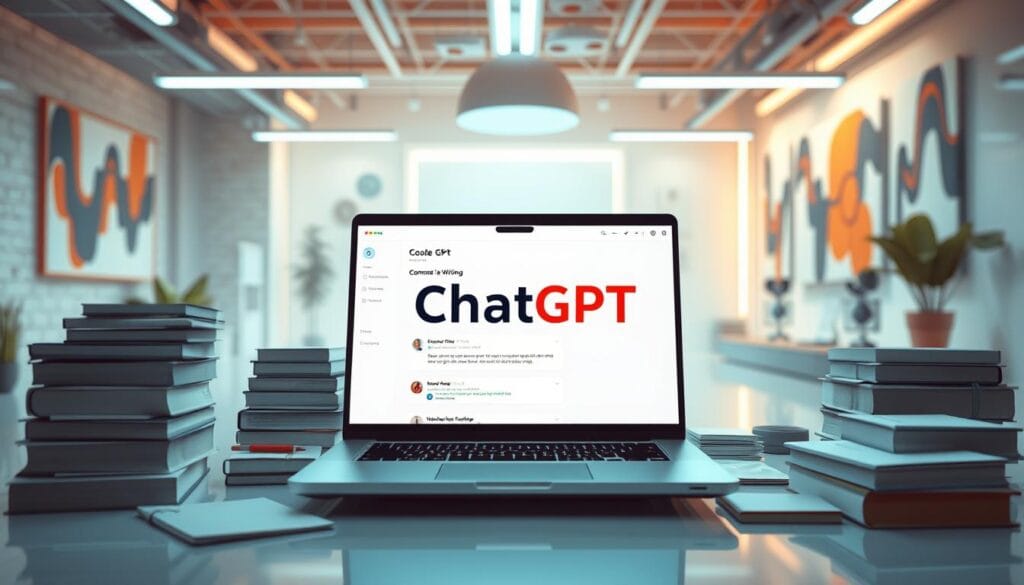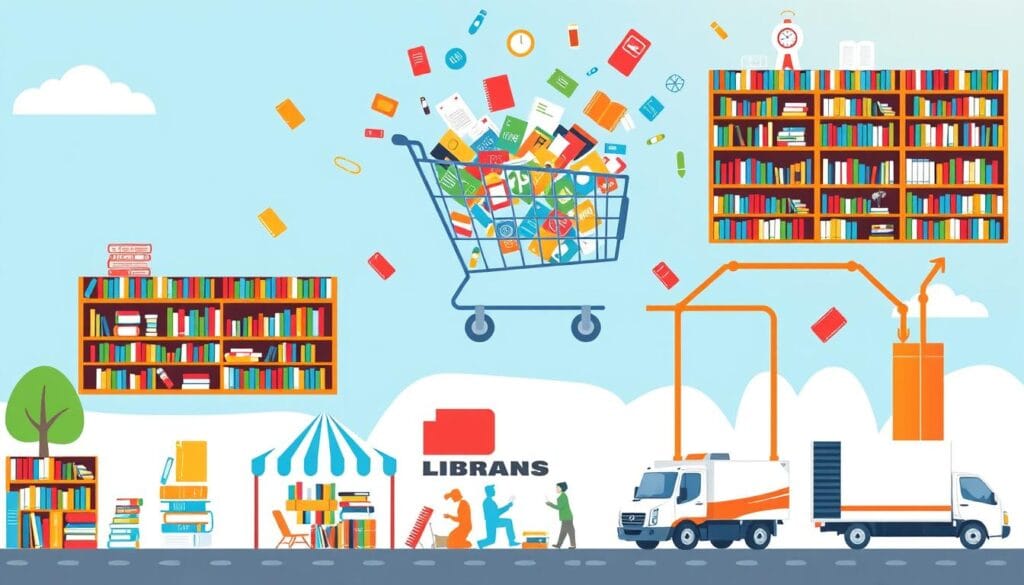“The best way to predict the future is to create it.” – Peter Drucker
In the rapidly evolving publishing landscape, many aspiring authors ponder, “Can I sell a book written by ChatGPT?” The advent of artificial intelligence in content creation has opened new avenues for creativity. It allows writers to use innovative tools in their storytelling. Yet, this potential comes with the need to understand the complexities of copyright, legality, and ethical concerns.
Those interested in ChatGPT book resale or selling books authored by ChatGPT must grasp these challenges. This knowledge is crucial for a successful launch and compliance with existing regulations.
For example, Amazon requires the disclosure of AI-generated content when self-publishing through its KDP platform. This highlights the importance of transparency in the writing process1. Moreover, the legal landscape is sharpening its focus on AI-generated works. The Authors Guild’s lawsuit against OpenAI for alleged “systematic theft” shows the need to stay informed and aligned with evolving legislation2.
Writers and innovators using tools like ChatGPT for inspiration must understand these frameworks. This knowledge will guide them toward ethical and fruitful engagements in the publishing world3.
Key Takeaways
- AI-generated content needs disclosure, especially when using platforms like Amazon KDP.
- Authors must be aware of the legal ramifications surrounding AI tools and content ownership.
- Successful monetization of AI-assisted books requires navigating copyright and ethical concerns.
- Transparency with readers enhances credibility and trust in AI-generated works.
- Exploring various uses of ChatGPT can lead to more effective and engaging storytelling.
Understanding Copyright in AI-Generated Content
With AI increasingly involved in literature creation, grasping copyright in AI-generated content is essential. Copyright acts as a legal shield, granting exclusive rights to original works. It protects creators from unauthorized use and ensures their intellectual property is safeguarded4.
What is Copyright?
Copyright is a vital protection for creators, establishing their ownership and control over artistic and written works. Traditionally, copyright applies to works by individuals, allowing authors to retain rights while publishers have specific permissions. Self-publishing on platforms like Amazon Kindle keeps authors’ copyright, highlighting the benefits of retaining creative control5.
How Copyright Applies to AI
Copyright laws face challenges when dealing with AI-generated content, particularly adapting to digital innovations. Laws remain applicable to outputs from models like ChatGPT, which use prior works. The implications of copyright in AI content depend on user input and the risk of infringing existing copyrights with generative models6.
Ownership of AI-Generated Works
The issue of copyright ownership in AI-generated works is complex and contentious. Outputs from AI, like those from ChatGPT, may technically belong to the user under certain conditions. However, the question of who truly owns AI-generated content remains a subject of debate among legal experts. The United States Copyright Office’s stance, requiring a human author for copyright protection, adds to the complexity. This situation necessitates authors using AI tools to document their creative processes and stay updated on evolving copyright laws456.
The Legal Landscape for AI-Generated Books
The rise of AI-generated books has introduced a complex legal scenario. With the growing use of AI tools like ChatGPT, grasping AI copyright laws is crucial for writers. In the U.S., current copyright laws do not acknowledge AI as creators. This forces human authors to navigate through existing laws to publish their work. The lack of clear regulations raises significant questions about the legal rights AI books may hold, particularly concerning authorship and ownership.
Current Laws in the United States
Writing a book with ChatGPT is legal, but creators must be mindful of originality and copyright. Copyright law protects literary works, but the legality of AI-generated content is still evolving. This has sparked debates in the legal field about authorship and copyright ownership. Authors using AI tools should document their creative process to establish intellectual property rights and avoid risks selling AI-generated content that might infringe on copyrights7.
Future Legislation and AI
The legislative landscape for AI-generated content is rapidly evolving. As AI technology progresses, lawmakers are working to establish regulations that define the legal status of AI works. This development could profoundly influence the rights of authorship and ownership, affecting the potential for legal rights AI books to be protected under copyright laws.
Assessing Risk and Liability
Authors considering AI-generated books must also consider the risks of copyright infringement. Many authors have seen their work used to train AI models without permission, leading to legal concerns. With the rise of new datasets, including over 200,000 eBooks, tensions between the publishing and tech industries are escalating. Authors are urged to ensure their work is original and to apply human oversight to avoid risks selling AI-generated content that could lead to legal liability for copyright infringement8.
Commercial Use of ChatGPT Creations

In today’s digital economy, grasping the commercial use ChatGPT means understanding activities aimed at profit. Authors using ChatGPT for selling AI creations must keep up with legal definitions and guidelines. This ensures they comply with the rules. The ability to monetize AI writing opens up various opportunities. However, it’s crucial to carefully navigate the surrounding limitations and restrictions.
Defining Commercial Use
Commercial use includes any activity aimed at profit, like selling books or creating instructional materials. It also includes launching subscription services based on ChatGPT-generated content. Authors must follow legal standards for sale and distribution to safeguard their interests and work.
Monetization Opportunities
There are many ways to monetize AI creations, like self-publishing books or selling digital formats. Offering services linked to ChatGPT-generated content is another option. The rapid growth of AI tools, like ChatGPT reaching 100 million users quickly, offers authors a chance to capitalize on this trend9. Thousands of businesses are already using ChatGPT to boost productivity, showing its potential for creativity and profit9.
Limitations and Restrictions
Authors need to watch out for platform policies that may restrict commercial use ChatGPT content, like Amazon’s rules for AI-generated works. Not following these guidelines could lead to content removal or account suspension. This highlights the need to understand the limitations in various self-publishing settings. Given the U.S. lacks a clear legal framework for AI-generated content, authors must be cautious and proactive in this area9.
Ethical Considerations in Selling AI-Written Books
The rise of AI-generated literature brings forth critical ethical concerns for authors. Transparency is a key issue, especially with the use of ChatGPT in crafting stories.
Transparency with Readers
Authors must prioritize honesty when selling AI books. By openly discussing AI’s role in the writing, trust is built. Readers should understand when they’re reading AI-generated content.
Crediting AI as a Tool
Viewing AI as a tool rather than the main creator is essential. Acknowledging human input in AI-generated content enhances the reader’s experience. This approach fosters appreciation for the complexity of literary creation.
The Debate on Authenticity
The authenticity of AI literature is a contentious topic. Critics question if AI-generated works are as valuable as human-written ones. The challenge of replicating an author’s unique voice or style, especially with existing characters, underscores the field’s complexities1011.
Marketing Your AI-Written Book

To successfully market an AI-written book, identifying the target audience for AI authors is crucial. Understanding the specific demographics and interests of potential readers can significantly influence marketing effectiveness.
Identifying Your Target Audience
Successful authors often analyze the interests shared within a reader group rather than using traditional avatar building methods. This strategy helps them design tailored marketing approaches, resulting in better engagement and sales. Notably, 85% of books sell fewer than 200 copies, underscoring the importance of reaching the right audience early in the marketing process12.
Effective Marketing Strategies
Implementing a diverse range of marketing strategies is vital for enhancing visibility. Email newsletters, book trailers, and author blogs can create buzz around the book. A well-designed author website can significantly impact perceptions of both the book’s quality and the author’s professionalism, driving more potential readers to explore available AI-written titles12.
Leveraging Social Media
Social media for book promotion serves as a key tool in engaging with readers. Platforms like X and Instagram allow authors to connect with their audience while promoting AI-authored titles. Since there were over 1,000 records in May 2023 for books listing ChatGPT as an author or co-author, authors can leverage this growing interest to build a supportive community around their work13.
Self-Publishing Platforms to Consider

For aspiring authors, selecting the right platform for publishing is crucial for success. Many platforms cater to self-publishing, opening doors to the world of self-publishing AI books. However, understanding each platform’s features and limitations poses its own set of challenges.
Popular Self-Publishing Services
Amazon KDP, Smashwords, and Lulu are among the top choices for authors. Amazon KDP stands out with its fast publishing timeline, allowing books to be live in 24-48 hours after submission14. This speed is especially beneficial for authors using AI-generated content, as it eliminates lengthy delays.
Comparison of Platforms
When comparing self-publishing platforms, consider factors like cost, royalties, distribution channels, and ease of use. For example, Amazon KDP accepts various file formats, including DOCX and PDF, catering to diverse author needs14. Also, evaluating a platform’s global reach helps authors target their audience more effectively, highlighting the benefits of self-publishing.
Pros and Cons of Self-Publishing
Self-publishing offers significant advantages, such as creative control and potentially higher earnings. Authors can craft their marketing strategies and have full control over their work. However, challenges remain, including marketing responsibilities and following platform guidelines. Overcoming these obstacles is key to successfully leveraging self-publishing’s benefits15.
Writing and Editing Your Book

The journey of writing and editing a book, especially one using AI tools, demands a delicate balance. ChatGPT shows how AI can quickly produce large amounts of text, over 8,500 words in under an hour. This speed is a boon for authors. Yet, the human touch is essential, as it brings emotional depth and clarity that AI often misses.
Importance of Human Touch
AI tools like ChatGPT can generate text, but human authorship is key for emotional and narrative depth. Editing ensures the content connects with the audience, turning outlines into engaging stories.
Revising AI-Generated Content
Revising AI content involves improving narrative quality by fixing repetitive phrases and ensuring sentence flow. This editing phase is vital for engaging readers with a clear voice. Since ChatGPT produces about 400 words per chapter, adjustments are needed to maintain narrative cohesion16.
Collaborating with Professional Editors
Working with professional editors can significantly improve AI-generated text. These experts offer crucial insights that enhance readability and marketability. By combining AI’s capabilities with human involvement, the final product becomes relatable and polished, ready for a wider audience1718.
Pricing Strategies for Your Book

Setting the right price for a book is key to its success in the competitive literary market. Authors need to grasp various book pricing strategies to effectively place their titles. The process of determining fair pricing for AI books involves balancing several factors that directly impact marketability and profitability.
Determining a Fair Price
Choosing the correct price point is critical for independent authors. It can affect the book’s ranking, discoverability, and overall sales performance. To formulate an effective pricing strategy, authors should analyze similar titles within their genre and review competitors’ pricing practices19.
Researching competitors’ pricing in the market is crucial to avoid pricing mistakes.
A systematic approach helps establish a balance between competitive pricing and maintaining profit margins. This maximizes revenue potential19.
Considering Production Costs
Authors must account for all production costs involved in the publishing process, including editing and cover design. These costs should inform the pricing strategy to ensure sustainability in earnings. Quality elements like professional cover design and editing services can significantly enhance the attractiveness of a book. They warrant a higher price tag20.
Special Pricing Promotions
Creating engaging promotions for self-published titles, such as discounted launches or limited-time offers, can generate buzz and stimulate sales. Using promotions smartly can attract price-conscious consumers who are searching for value in their purchases20. Utilizing a Book Pricing Strategy Generator can streamline the pricing process. It provides adaptable recommendations based on current market conditions and consumer demand19. These generators rely on data analysis, ensuring that pricing decisions are informed rather than based on instinct19.
With thoughtful consideration of production costs, competitive pricing, and effective promotional tactics, authors can better position their books for success in today’s market21.
Distribution Options for Your Book

Authors seeking to maximize their book’s reach must select the right distribution options. The landscape of distribution options has evolved, offering various pathways to present work to audiences. Writers should weigh the benefits of each choice, especially the differences between digital publishing vs print.
Digital vs. Print Formats
Authors face a crucial decision between digital and print formats in book distribution channels. Digital options are often cost-effective, requiring less overhead. In contrast, print formats may attract different readers. Amazon’s free ISBNs for print books simplify entry into retail markets, expanding audiences22.
Global Distribution Channels
Services like IngramSpark are essential for broader market access, distributing to over 40,000 bookstores, libraries, and online retailers23. This extensive reach is complemented by platforms like PublishDrive, connecting authors to over 390,000 stores and 200 libraries23. Self-publishing authors should obtain their own ISBNs to establish a distinct publisher identity, combating fraudulent activities22.
Local Bookstores and Events
Selling books locally through independent bookstores and community events is another effective strategy. Engaging with local communities boosts interest in an author’s work. Authors should seek partnerships with local bookstores for readings or signings, promoting their books and building reader relationships.
Combining global and local distribution strategies, along with understanding digital publishing vs print nuances, can expand authors’ reach. Resources like Amazon’s guide on distribution options help navigate these opportunities.
Engaging with Your Readers

Creating a lasting bond with readers is key for any author. Engaging with your audience boosts their reading joy and builds a community around your work. By using effective strategies, you can greatly enhance reader interaction and build a devoted fan base.
Building an Online Community
It’s crucial to have platforms for readers to interact. Authors can leverage social media, forums, and newsletters to reach out to their audience. This interaction creates a sense of belonging, encouraging readers to share their positive experiences with others.
Hosting Events and Readings
Live or virtual events offer a chance for authors to meet readers face-to-face. Hosting book readings, Q&A sessions, or webinars allows for direct interaction. By sharing their creative process, authors can leave a lasting impression on attendees.
Gathering Feedback and Reviews
Collecting feedback is vital for growth and improvement. Seeking out reader reviews offers insights into how your book is received and suggestions for future projects. Encouraging reviews on platforms like Amazon or Goodreads boosts visibility and credibility in a competitive market.
Understanding Sales Metrics

For authors, grasping sales metrics is key to boosting their book’s success in a crowded market. By tracking and analyzing these metrics, writers can uncover valuable insights into their sales patterns and reader engagement. This knowledge is crucial for making informed decisions to improve their book’s performance.
Tracking Your Book Sales
Monitoring book sales is vital for authors to gauge their performance and spot trends. This information is essential for making adjustments to pricing or marketing strategies. Authors can use various tools to collect sales analytics, providing a detailed overview of their sales journey. Understanding these numbers is fundamental, as it lays the groundwork for future decisions that could impact revenue.
Analyzing Reader Engagement
Examining reader data is critical for authors aiming to strengthen their connection with their audience. By analyzing effective metrics, authors can gauge how well readers are engaging with their content. This knowledge allows authors to craft targeted marketing campaigns that boost visibility. For example, insights into reader demographics and preferences can guide more effective promotional strategies.
Adjusting Your Strategy Based on Data
Using data-driven insights to adjust strategies related to pricing and promotions is a powerful approach. An author who closely monitors their book sales and reader engagement can make strategic decisions to optimize their sales potential. By adopting a flexible strategy based on real-time data, authors can keep their marketing efforts fresh and effective.
Future Trends in AI and Publishing

The future of AI in publishing is about transforming writing and editing. AI tools like OpenAI’s GPT are already creating articles, essays, and poetry. This shows their significant role in content creation. It allows authors to explore new ways of writing, boosting creativity and reducing the pressure of writing and editing.
The Evolving Role of AI in Writing
AI tools are now essential in the industry, helping with grammar checks and style suggestions. They have made publishing more accessible and efficient24. However, there’s a risk that AI could lead to less original work25. As AI gets better, it’s crucial to use it wisely to keep writing unique and high-quality.
Predictions for the Publishing Industry
Experts predict big changes in publishing thanks to AI. AI will analyze data to predict trends, affecting inventory management24. AI editing tools will make content creation faster, but there’s a risk of mediocrity25. This calls for a balance in using AI to keep authors’ unique voices.
Staying Ahead of the Curve
Authors and publishers must keep up with AI trends and innovations. Learning about new AI tools and market shifts is key26. As AI shapes publishing’s future, using predictive analytics will help meet reader and market needs24.
Conclusion: Your Path to Publishing Success
Aspiring authors now have a wealth of opportunities to explore in their journey to publishing success with AI. Tools like ChatGPT can greatly simplify the writing process, allowing for more creativity. This is especially true as the interest in using AI for writing grows, with over 32,782 YouTube searches last month alone27. Additionally, one author has already made nearly $10,000 from just 10 titles on Amazon this year, highlighting the potential earnings27.
Encouragement to Take Action
Authors should actively use AI in their creative writing endeavors. Whether for brainstorming or refining ideas, tools like ChatGPT can be invaluable. They assist at every stage, from outlining to marketing strategies28. For instance, choosing the right keywords can significantly boost sales; “Valentines books” saw 2,654 sales last month, while “valentine books” reached 1,90227. Utilizing keyword research tools can help authors find titles that connect with their audience.
Resources for Aspiring Authors
Exploring various resources for authors is key to navigating the publishing world effectively. From editing services to self-publishing platforms, these tools can greatly increase success chances. Effective marketing, including social media and Amazon, can lead to significant profits, as seen in a case where a book sold over 11,000 copies a month, earning around $39,60027.
Final Thoughts on AI and Creativity
The blend of AI and creativity is revolutionizing storytelling. While the possibilities are endless, it’s vital for authors to maintain a human touch in their work. This ensures their stories connect on a deeper level. By merging AI’s strengths with genuine storytelling, a new generation of innovative authors can thrive. Their potential to create impactful content is only bound by their imagination.
FAQ
Can I sell a book written with the help of ChatGPT?
What is Copyright?
How does copyright apply to AI-generated content?
Who owns the rights to works generated by AI like ChatGPT?
What are the current laws in the United States regarding AI-generated works?
Should I be concerned about legal risks when selling AI-generated books?
What constitutes ‘commercial use’ of ChatGPT-generated writings?
How can I monetize a book created with ChatGPT?
Do I need to inform readers that my book is AI-generated?
How can I effectively market my AI-generated book?
What self-publishing platforms should I consider?
Is it important to revise AI-generated content?
How can I determine a fair price for my AI-generated book?
What are the benefits of building an online community around my writing?
What are the future trends for AI in the publishing industry?
Source Links
- Can I Use ChatGPT to Write a Book? 7 Better Writing Ideas
- Can You Legally Use ChatGPT to Write a Book
- Can ChatGPT Write My Book? (Step-By Step Process)
- Copyright and ChatGPT: Who owns AI-generated content?
- Are there any legal or copyright concerns when using ChatGPT-generated content?
- Legal Issues with AI-Generated Content: Copyright and ChatGPT | Article | Chambers and Partners
- Is It Legal to Use ChatGPT to Write a Book? Understanding Your Rights as an Author
- Inside the Legal Tussle Between Authors and AI: “We’ve Got to Attack This From All Directions”
- Council Post: 6 Legal Considerations When Using ChatGPT For Content Creation
- Some questions on copyrighted material
- Question: Is It Legal to Use AI to Write a Book? | Is That Legal?
- I Asked ChatGPT How To Market A Book If I Suck At Marketing And Wow
- How to Use ChatGPT to Sell on Amazon KDP
- How to Create and Publish ChatGPT Kindle Books: A Complete Guide
- Using AI to Write a Book: Guide to Self-Publishing eBooks
- How I used ChatGPT to write and publish a book in under 3 hours*
- How to Write a Book in ChatGPT: My Complete Process
- Should You Let AI Write Your Book for You?
- AI Book Pricing Strategy Generator
- Expert Techniques for Pricing Your Book
- How to Market Your Amazon KDP Books with ChatGPT
- How AI-Generated Books Could Hurt Self-Publishing Authors | Jane Friedman
- Top 10 Book Distribution Services for Authors in 2024
- AI In Publishing: Revolutionizing Your Journey As An Author
- Council Post: Seven Ways AI Will Impact Authors And The Publishing Industry
- The Next Page: AI’s Revolution in Publishing
- Why Most Books Written with ChatGPT Make $0
- Effective Book Writing Tips with ChatGPT







